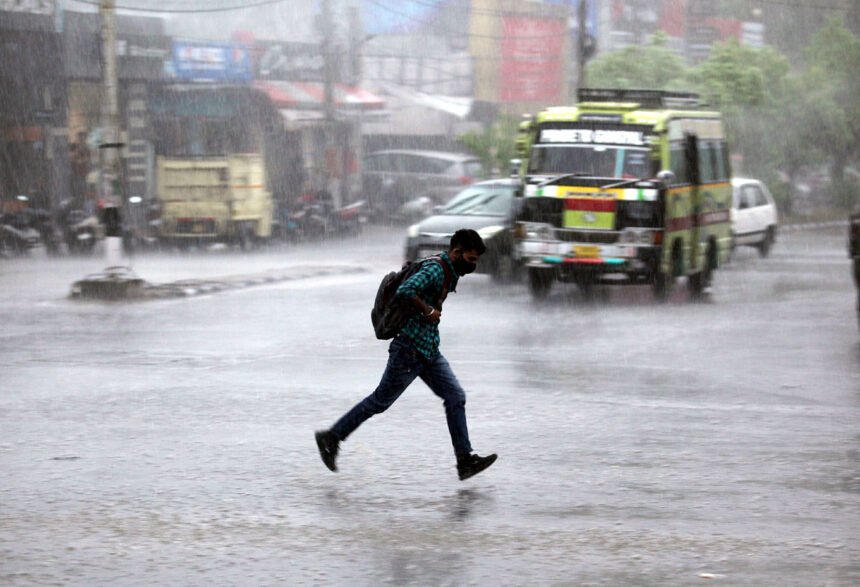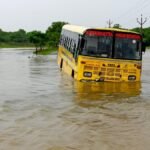A devastating incident unfolded in the picturesque Ramban district of Jammu and Kashmir, where a 55-year-old man lost his life after being struck by a rolling stone from a hillock during a spell of heavy rains. The victim, identified as Abdul Rashid Bhat, was en route to Chakki in the Pogal Paristan area when the tragic accident occurred, leaving the entire community in shock and grief.
According to Tehsildar Nasir Javed, the region experienced intense rainfall, cloudbursts, and flash floods during the morning. The natural calamity took a grave toll on the area, resulting in significant damages to infrastructure and residential properties. A residential house in Alinbass-A, Chanbas, bore the brunt of the raging floods, while a section of the Ukhral-Senabathi road suffered extensive damage, disrupting transportation and connectivity in the region.
Abdul Rashid Bhat’s untimely demise serves as a grim reminder of the dangers posed by the unpredictable and volatile weather conditions that are often synonymous with hilly regions. The lush green landscapes and serene beauty of Jammu and Kashmir can be deceptive, as they are also susceptible to natural hazards, particularly during the monsoon season.
The incident has sparked conversations about the need for improved safety measures and awareness campaigns to safeguard the lives of local residents and travelers passing through such vulnerable areas. Rolling stones and debris from hillocks have long been a cause of concern in hilly regions, especially during heavy rains when the ground becomes loose and unstable.
The local authorities and disaster management teams are actively working on mitigating the impact of the calamity and assessing the extent of the damages caused by the flash floods and landslides. Rescue operations have been initiated to ensure the safety of residents and to provide timely assistance to those affected by the catastrophe.
The tragic loss of Abdul Rashid Bhat has also raised questions about the safety precautions taken by individuals venturing out in adverse weather conditions. While authorities and rescue teams play a crucial role in ensuring public safety, it is equally important for citizens to exercise caution and avoid venturing into high-risk zones during inclement weather.
Additionally, efforts are underway to create awareness among the local population about the dangers of natural calamities and the necessity of adhering to safety protocols. Educational programs, workshops, and community meetings are being organized to disseminate crucial information on disaster preparedness and response measures.
The incident has garnered attention beyond the immediate vicinity, prompting discussions about the broader implications of climate change on weather patterns and the increased occurrence of extreme weather events. Scholars, environmentalists, and policymakers are emphasizing the urgency of adopting sustainable practices to mitigate the impact of climate change and reduce the vulnerability of communities living in hilly and ecologically sensitive regions.
As the region copes with the aftermath of the devastating event, the resilience and solidarity of the community have come to the fore. Neighbors are coming together to support those affected by the floods and landslides, providing shelter, food, and assistance in rebuilding damaged structures.
In the wake of this tragedy, the administration has pledged to accelerate efforts to strengthen the region’s infrastructure and implement measures to prevent such incidents in the future. Geologists and experts in the field are being consulted to conduct thorough geological surveys to identify vulnerable areas and develop strategies to minimize risks.
The loss of Abdul Rashid Bhat’s life is a somber reminder of the forces of nature and the importance of collective responsibility in safeguarding lives and properties. It underscores the necessity of prioritizing disaster preparedness and investing in infrastructure and resources that can withstand the challenges posed by natural disasters.
As the community mourns the loss of one of its own, the incident serves as a call to action for comprehensive measures to address the increasing risks associated with climate change and to protect the lives and livelihoods of people residing in vulnerable regions like Ramban district. Only through proactive efforts, cooperation, and awareness can we hope to build a safer and more resilient future.









